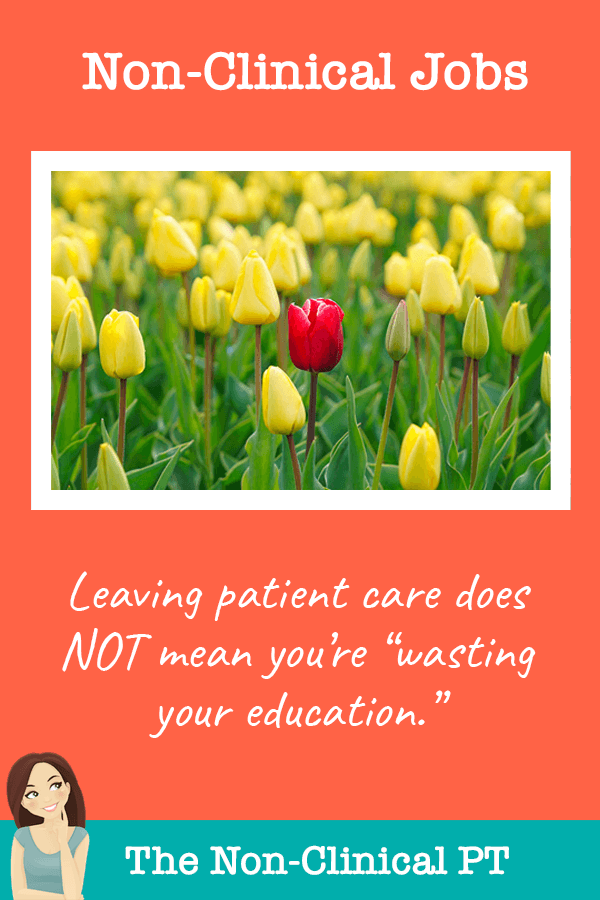I can’t remember the exact moment when I realized I didn’t want to work full-time as a clinical physical therapist.
I do know it came after three of the most academically challenging years of my life. It came after tens of thousands of dollars in tuition, and years of putting off a steady income to pursue graduate school.
It also came after some of the most fun and fulfilling years of my life.
Three years of making lifelong friendships, and learning more about the human body than I’d ever dreamed I could remember. It came after helping rehabilitate my first two patients after their strokes, rejoicing with them at every new skill and accomplishment as if they were my own.
I can’t remember the moment I knew it wasn’t for me, because there were many moments.
The whys and wherefores are varied and, honestly, are neither here nor there, because people decide to change careers for all manner of reasons.
And this piece isn’t about why people change their minds, or get burned out, or seek novelty.
It’s about feeling the desire for change and embracing it—and not giving in to the guilt or shame that can sneak up on you.
This post may contain affiliate links or codes. This won’t increase your cost, but it helps keep TNCPT alive, and free of annoying ads! Thank you for your support. 🙂
Coming clean to my loved ones.
The first thought I had when I was realizing that the career choice I had poured my heart, soul, sweat and tears into was no longer my dream, was: how do I talk about this with my friends and family?
I was on the cusp of graduation and ready to begin studying for the board exam and searching for jobs. These people—my people—had seen me work toward this goal for years now. How could I begin to explain my change of heart?
I want to take a minute here to acknowledge that I realize I am incredibly fortunate. I have a loving and supportive network of family and friends, and enough of a financial safety net to take a step back and evaluate my plans and desires for the future. I know these factors can be the difference between feeling trapped in a career choice and deciding to venture into new territory.
So I started with one person: my father.
He had always been my advice guru, and had been through some big career changes in his own life.
Through tears, I tried to explain the thoughts and feelings I’d been struggling with over the past few months. His initial response calmed me down, and his words spoke right to one of my core fears about this drastic change I was considering.
He said, “Your education will never be a waste.”
Somehow, he knew that this was one of my biggest mental roadblocks to accepting the idea of changing my path. He knew I was asking myself how I studied this intensely for three years, only to throw it all away.
But his words reverberated within me, and were reinforced when I delved into a wonderful book on embracing life’s messiness.
Reading a life-changing book.
One of the most influential books I’ve read is Tim Harford’s Messy. He discusses the benefits that disorder can bring to our lives.
In one of my favorite parts, Harford discusses the winding career of a man named Erez Lieberman Aiden.
Aiden’s story is, perhaps, the most extreme example of switching paths and following one’s curiosities. As Aiden tells it, “I really try to figure out what sort of scientist I need to be in order to solve the problem I’m interested in solving.”
Those words could not be a more accurate description of what Aiden has done.
In fact, Aiden has pursued all of the following before the age of 40:
- Physics
- Molecular biology
- History
- Math
- Linguistics
- Engineering
Yes, all before he turned 40!
Aiden has used his multi-disciplinary experience to solve some incredibly tough problems, and has won some notable awards along the way.
Harford goes on to note that Aiden might not be as much of an anomaly as he seems, and that top scientists actually switch research topics quite often—some more than forty times!
Learning about other career-changers.
Once I began to embrace the possibility of making a change, I began to seek out more stories of others who had done the same.
And I began to see and hear them everywhere.
I was particularly inspired one day during my commute. While I was listening to the Fresh Air program on NPR, I heard a story about a woman who saw a need in the mechanic industry.
Patrice Banks was an engineer and, like many other women, she felt intimidated taking her car to the garage for maintenance or repairs. She looked for a female mechanic she would feel more comfortable with, but couldn’t find one—so she began to attend mechanic classes and teach herself how to repair cars.
Here’s how she described her night classes at a technical school: “I was the only girl with a bunch of boys, 19-year-old boys,’ she says. ‘That was interesting. I was 31.’”
I love this part of the story because it highlights the fact that Banks needed to go through some uncomfortable moments and challenges to pursue her new dream.
She left her six-figure salary to work at a few garages to learn the ropes, before eventually opening her own business—Girls Auto Clinic. If you’re looking for inspiration for changing paths, I recommend you go read or listen to the whole interview with Banks.
Editor’s Note: Check out our spotlight series for inspiring interviews of non-clinical PT, OT, and SLP professionals!
Finding my own path.
So what path did I decide to pursue? With a bit of hustle and good fortune, I landed a job as a research physical therapist after graduation. I worked at the VA, teaching people with SCIs how to use robotic exoskeletons.
It was a blast! It was still in the physical therapy world, but different enough from the clinic. I was using my degree, but wasn’t working the traditional patient care model.
That role was a contract assignment, and would eventually come to an end, so I had a decision to make: should I re-join the traditional physical therapy career path and find a clinical role that may or may not make me happy—or should I follow my heart and pursue something that truly excited me?
I wound up taking a role as a clinical consultant at a small medical device company called Leaf Healthcare, and I’ve been there ever since. I strongly believe in their mission and their product, and I am so proud to be a part of their team.
Editor’s note:
Melissa has since moved on to become Director of Education at Alzheimer’s Orange County!
Stay tuned for an updated spotlight soon 🙂
Although I haven’t held traditional clinically oriented physical therapy roles, each of my jobs has ended up falling well within the realm of physical therapy.
But even if they hadn’t, I can tell you that my education would still not have been a waste.

I use my knowledge and skills every day as I care for my mother with advanced early-onset Alzheimer’s disease.
And we PTs can take many of our other non-clinical skills—including decision-making, negotiation, time-management, critical thinking, diagnostics, and more—and apply them to our professional and personal lives in countless ways.
Embracing uncertainty in your career.
We don’t know what life holds for us, but I can guarantee that at some point, we will all find ourselves in situations where our rehab backgrounds will serve us extremely well.
Whether your path takes you far away from physical therapy, or you remain in a career associated with healthcare, no one can take away the knowledge, skills, and confidence for which you worked so hard.
At the end of the day, you are the one who must weigh the factors in your life and decide which path is right for you, but life is too short to not allow yourself to explore the myriad of options available to you.






